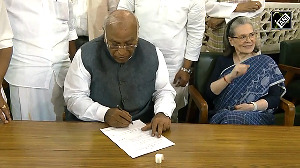Confusion persists over which wing of the Pakistan government is currently controlling the powerful ISI agency, which is at the centre of a controversy after being linked by US intelligence agencies to the suicide bombings on the Indian embassy in Kabul.
The Pakistan People's Party-led government became embroiled in the controversy when it hastily issued a notification on July 26 that said the Inter-Services Intelligence (ISI) and Intelligence Bureau (IB) were being placed under the control of the interior ministry.
Following strong opposition to the move from the Pakistan Army, which provides the ISI's officer cadre, and President Pervez Musharraf, the government issued a
clarification that said the agency would continue to perform under the Prime Minister and that the earlier notification had been "misinterpreted".
The clarification suggested the government had reversed its earlier decision but the initial notification issued by the Cabinet Division has not yet been formally withdrawn, The News daily reported today.
This has raised questions as to whether the government had again changed its mind and decided to keep the ISI under the interior ministry. The fact that the notification has not
been withdrawn by the Cabinet Division means that the ISI and the IB "stand transferred to the interior ministry", the report said.
A source in the interior ministry told the newspaper that "some authorities" had been verbally informed to maintain the earlier status of the ISI. However, it is believed the
confusion over the control of the ISI would remain till the Cabinet Division's notification is "formally cancelled".
The controversy over the control of the ISI broke just as Prime Minister Yousuf Raza Gilani reached Washington on his maiden visit to the US after assuming the post.
Top US officials, including President George W Bush and Central Intelligence Agency chief Michael V Hayden, confronted Gilani about the ISI's links to militants and the suicide attack on the Indian embassy in Kabul.
Bush asked Gilani and his delegation who was in control of the ISI. Bush also said the US was reluctant to share intelligence with Pakistan because such information was leaked to militants by elements in the ISI.
India too has linked the ISI to the deadly attack on its embassy in Kabul, which claimed 60 lives, including those of its two top diplomats.
Pakistan has dismissed the allegations against the spy agency, describing them as "total rubbish".
PPP chief Asif Ali Zardari initially backed the move to place the ISI under civilian control, saying it would help prevent other countries from accusing the agency of fomenting terrorism. However, he later toned down his remarks, saying the interior ministry would have the role of "an assistant in the affairs looked after by the ISI".
It is widely believed that Rehman Malik, a close aide of Zardari who functions as the interior minister, was behind the move to put the ISI under the ministry's control. He too subsequently distanced himself from the move and said he would look into the matter to fix responsibility.






